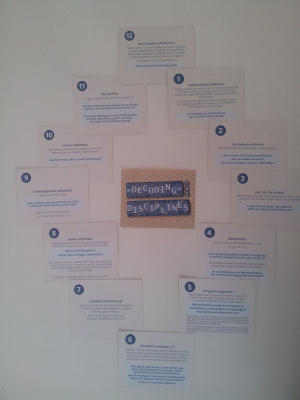(saving work) |
mNo edit summary Tag: 2017 source edit |
||
| Line 4: | Line 4: | ||
==Writing prompts== | ==Writing prompts== | ||
[[File:writing process.jpg|alt=photo of writing prompts printed on cards|thumb|Flash cards containing writing prompts]] | [[File:writing process.jpg|alt=photo of writing prompts printed on cards|thumb|Flash cards containing writing prompts]] | ||
===Determine the bottleneck=== | ===Determine the bottleneck=== | ||
Ask yourself: In which situation do students struggle or fail in my class? What type of tasks or (exam) problems are regularly difficult for them? List some of these situations. | Ask yourself: In which situation do students struggle or fail in my class? What type of tasks or (exam) problems are regularly difficult for them? List some of these situations. | ||
| Line 22: | Line 21: | ||
===What experts do=== | ===What experts do=== | ||
Try to describe in more detail how a professional in your discipline would proceed when faced with the problem: What steps would a professional take to accomplish the task? What would he/she do? | Try to describe in more detail how a professional in your discipline would proceed when faced with the problem: What steps would a professional take to accomplish the task? What would he/she do? | ||
Revision as of 17:11, 25 July 2024
Although frequently featured, the Decoding interview is by now means the exclusive method for decoding expertise. Svenja Kaduk and Swantje Lahm have developed a structured writing process that allows teachers to decode their expertise by themselves. To this end, they answer a series of questions about the bottleneck and then about the thinking they do to get through the bottleneck. The questions are provided as writing prompts. Originally the prompts have been written in German.[1]
Formally, the writing process is a combination of Steps 1 and 2 of the Decoding process.
Writing prompts
Determine the bottleneck
Ask yourself: In which situation do students struggle or fail in my class? What type of tasks or (exam) problems are regularly difficult for them? List some of these situations.
Then decide to proceed with a bottleneck on your list you are really concerned about.
Explicate the bottleneck
Describe the bottleneck as precisely as possible. What is it that students don't do or don't do correctly? What is it that they don't understand?
What do you do?
Describe what you as an expert in your discipline do, such that you do not get stuck. For example ask yourself: What do I do to cope with the bottleneck?
Check
Look again at the bottleneck and ask yourself: Have I selected a too large bottleneck? Or one that is too small? Is its description too vague? Is the bottleneck really about an issue which is essential to my discipline or class?
Again, describe the bottleneck as precisely as possible. Ask yourself: Is the bottleneck related to characteristic misconceptions?
What experts do
Try to describe in more detail how a professional in your discipline would proceed when faced with the problem: What steps would a professional take to accomplish the task? What would he/she do?
Many of these steps may be so obvious to you that you are not aware of them. Try to make yourself aware of these steps and break large steps down into as many sub-steps as possible.
Example: A specialist in German studies says: "Students must first observe before they interpret." The next question would be: What does a Germanist do when she observes?
Ask for feedback (1)
Explain the learning obstacle to a colleague from another subject. Then describe what you do as a professional. The colleague will ask if he/she has not understood something.
Get feedback (2)
...
Continue writing
...
Detect difficulties
...
Continue writing
...
Reflect
...
